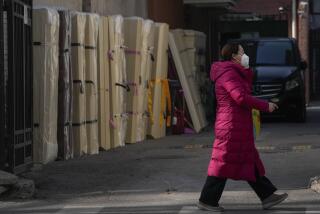A Giddy China Is in a Mood to Buy
- Share via
SHANGHAI — In stark contrast to the prevailing global economic gloom, China celebrated 52 years of Communist rule this week by going on a spending spree.
The world’s most populous nation splurged on all the things much of the world took for granted until the recent terrorist attacks in the U.S., including jumbo jets and skyscrapers.
China is particularly upbeat after recently winning the right to host the 2008 Olympics and clearing final hurdles to join the World Trade Organization. Adding to the celebratory mood this year is the fact that the Oct. 1 National Day coincided with another traditional family holiday, the Mid-Autumn Festival. To the Chinese, that’s like having Christmas and Thanksgiving rolled into one.
To the authorities, it’s also been a golden opportunity to invigorate the domestic economy. Beijing has relied on these state-imposed national holidays in recent years to stimulate consumption, and authorities now consider the nation’s economic health more important than ever as China tries to buffer itself against the possibly negative impact of participating in a global marketplace, especially in the post-attack world.
This week, business has been unusually good.
Although many international airlines have been plagued by cancellations and cutbacks, China added more than 1,000 flights to accommodate extra holiday traffic. As many as 60 million people were expected to hit the road visiting families and playing tourist. Security was tightened at all airports, especially in the northwestern Xinjiang region, where the country’s sometimes restive Muslim minority lives on the border with Afghanistan and Pakistan.
Even before last month’s attacks on the U.S., China had put air marshals on sensitive routes to prevent mainlanders from hijacking planes to Taiwan, the island that broke away from China after a 1949 civil war. But this week, plainclothes and uniformed police have been out in force in Shanghai and other major cities, patrolling landmarks and tourist attractions. Shoppers have apparently paid no mind as they’ve mobbed department stores and turned wide boulevards into thick seas of people.
By midweek, Shanghai’s 190 leading retailers had racked up an estimated $175 million in sales, up 21.9% from the same period last year, according to the Shanghai Daily. Sales at supermarkets had also shot up, by as much as 38%. Local five-star hotels have turned into wedding factories. Families have splurged on limo rides, fancy flowers, photo shoots and elaborate banquets. Even street vendors have raked in money selling animal balloons and miniature national flags.
Real estate developers have taken advantage of the golden week by staying open longer and offering special exhibits. Potential buyers have lined up to purchase apartments even before construction is underway. Items ranging from computers to mobile phones have seemed to fly off the shelves.
The biggest spender has been the government. Early in the week, Chinese airlines ordered 30 Boeing aircraft at a cost of about $1.6 billion. China is believed to be the world’s fastest-growing aviation market, expanding at a rate of about 11% a year. Worldwide, the rate is only about 5%, according to airline officials. China is expected to need about 1,700 new commercial jets in the next 20 years, making it the largest market after the U.S.
Festivities aside, China is distant but not completely removed from the global downturn. Analysts have already predicted that its economic growth will slow next year. Domestic demand is limited. And exports are dwindling because of sluggish demand overseas, especially from the U.S., which is China’s largest trading partner after Japan.
That won’t keep Beijing from doing its best to spur growth. The ultimate sign that it wants to defy the odds is its determination to build the world’s tallest skyscraper by the time of the 2008 Olympics. The 1,509-foot Shanghai World Financial Center is expected to spring up next to the 1,380-foot Jin Mao Tower, currently China’s tallest building.
Plans for the skyscraper stalled after the Asian financial crisis hit in the late 1990s. Supporters believe that if the project can be revived, it will serve as an important symbol of the country’s economic vitality. They say there is little reason to worry that it could become another victim of terrorism.
“The World Trade Center was attacked not because it is tall but because of resentment against American policy,” said Lu Deming, director of Fudan University’s Economics Institute. “As long as China does not become a political bully, it should not become a high-risk target.”
More to Read
Sign up for Essential California
The most important California stories and recommendations in your inbox every morning.
You may occasionally receive promotional content from the Los Angeles Times.













